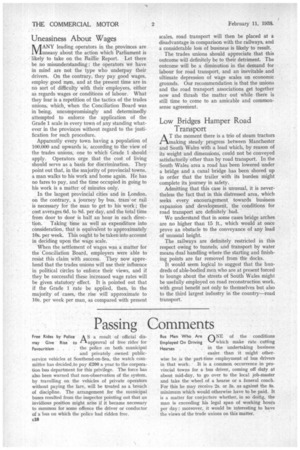Uneasiness About Wages
Page 68

If you've noticed an error in this article please click here to report it so we can fix it.
fiANY leading operators in the provinces are Vinneasy about the action which Parliament is likely to take on the Baillie Report. Let there be no misunderstanding : the operators we have in mind are not the type who underpay their drivers. On the contrary, they pay good wages, employ good men, and at the present time are in no sort of difficulty with their employees, either as regards wages or conditions of labour. What they fear is a repetition of the tactics of the trades unions, which, when the Conciliation Board was in being, uncompromisingly and determinedly attempted to enforce the application of the Grade 1 scale in every town of any standing whatever in the provinces without regard to the justification for such procedure.
Apparently every town having a population of 100,000 and upwards is, according to the view of the trades unions, one to which Grade 1 should apply. Operators urge that the cost of living should serve as a basis for discrimination. They point out that, in the majority of provincial towns, a man walks to his work and home again. He has no fares to pay, and the time occupied in going to his work is a matter of minutes only.
In the largest provincial cities and in London, on the contrary, a journey by bus, tram-or rail is necessary for the man to get to his work ; the cost averages 6d. to 8d. per day, and the total time from door to door is half an hour in each direction. Taking time as well as expenditure into consideration, that is equivalent to approximately 10s. per week. This ought to be taken into account in deciding upon the wage scale.
When the settlement of wages was a matter for the Conciliation Board, employers were able to resist this claim with success. They now apprehend that the trades unions will use their influence in political circles to enforce their views, and if they be successful these increased wage rates will be given statutory effect. It is pointed out that if the Grade 1 rate be applied, then, in the majority of cases, the rise will approximate to 10s. per week per man, as compared with present scales, road transport will then be placed at a disadvantage in comparison with the railways, and a considerable loss of business is likely to result.
The trades unions should appreciate that this outcome will definitely be to their detriment. The outcome will be a diminution in the demand for labour for road transport, and an inevitable and ultimate depression of wage scales on economic grounds. Our recommendation is that the unions and the road transport associations get together now and thrash the matter out while there is still time to come to an amicable and commonsense agreement.
Low Bridges Hamper Road Transport
AT T the moment there is a trio of steam tractors L',,making steady progress between Manchester and South Wales with a load which, by reason of its weight and dimensions, could not be conveyed satisfactorily other than by road transport. In the South Wales area a road has been lowered under a bridge and a canal bridge has been shored up in order that the trailer with its burden might complete its journey in safety.
Admitting that this case is unusual, it is nevertheless the fact that in this distressed area, which seeks every encouragement towards business expansion and development, the conditions for road transport are definitely bad.
We understand that in some cases bridge arches are no higher than 15 ft., which would at once prove an obstacle to the conveyance of any load of unusual height.
The railways are definitely restricted in this respect owing to tunnels; and transport by water means dual handling where the starting and finishing points are far removed from the docks.
It would seem logical to suggest that the hundreds of able-bodied men who are at present forced to lounge about the streets of South Wales might be usefully employed on road reconstruction work, with great benefit not only to themselves but also to the third largest industry in the country—road transport.




























































































































































